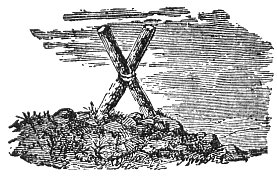The formula which the primitive church pronounced at the moment of celebrating its Mysteries, was this: “Depart, ye Profane! Let the Catechumens, and those who have not been admitted or initiated, go forth.”
Archelaus, Bishop of Cascara in Mesopotamia, who, in the year 278, conducted a controversy with the Manichæans, said: “These Mysteries the church now communicates to him who has passed through the introductory Degree. They are not explained to the Gentiles at all; nor are they taught openly in the hearing of Catechumens; but much that is spoken is in disguised terms, that the
p. 545
[paragraph continues] Faithful [Πιστοί], who possess the knowledge, may be still more informed, and those who are not acquainted with it, may suffer no disadvantage.”
Cyril, Bishop of Jerusalem, was born in the year 315, and died in 386. In his Catechesis he says: “The Lord spake in parables to His hearers in general; but to His disciples He explained in private the parables and allegories which He spoke in public. The splendor of glory is for those who are early enlightened: obscurity and darkness are the portion of the unbelievers and ignorant. Just so the church discovers its Mysteries to those who have advanced beyond the class of Catechumens: we employ obscure terms with others.”
St. Basil, the Great Bishop of Cæsarea, born in the year 326, and dying in the year 376, says: “We receive the dogmas transmitted to us by writing, and those which have descended to us from the Apostles, beneath the mystery of oral tradition: for several things have been handed to us without writing, lest the vulgar, too familiar with our dogmas, should lose a due respect for them. . . . This is what the uninitiated are not permitted to contemplate; and how should it ever be proper to write and circulate among the people an account of them?”
St. Gregory Nazianzen, Bishop of Constantinople, A. D. 379, says: “You have heard as much of the Mystery as we are allowed to speak openly in the ears of all; the rest will be communicated to you in private; and that you must retain within yourself. . . . Our Mysteries are not to be made known to strangers.”
St. Ambrose, Archbishop of Milan, who was born in 340, and died in 393, says in his work De Mysteriis: “All the Mystery should be kept concealed, guarded by faithful silence, lest it should be inconsiderately divulged to the ears of the Profane. . . . . It is not given to all to contemplate the depths of our Mysteries . . . . that they may not be seen by those who ought not to behold them; nor received by those who cannot preserve them.” And in another work: “He sins against God, who divulges to the unworthy the Mysteries confided to him. The danger is not merely in violating truth, but in telling truth, if he allow himself to give hints of them to those from whom they ought to be concealed . . . . Beware of casting pearls before swine! . . . . Every Mystery ought to be kept secret; and, as it were, to be covered over by silence, lest it should rashly
p. 546
be divulged to the ears of the Profane. Take heed that you do not incautiously reveal the Mysteries!”
St. Augustine, Bishop of Hippo, who was born in 347, and died in 430, says in one of his discourses: “Having dismissed the Catechumens, we have retained you only to be our hearers; because, besides those things which belong to all Christians in common, we are now to discourse to you of sublime Mysteries, which none are qualified to hear, but those who, by the Master’s favor, are made partakers of them. . . . . To have taught them openly, would have been to betray them.” And he refers to the Ark of the Covenant, and says that it signified a Mystery, or secret of God, shadowed over by the cherubim of glory, and honored by being veiled.
St. Chrysostom and St. Augustine speak of initiation more than fifty times. St. Ambrose writes to those who are initiated; and initiation was not merely baptism, or admission into the church, but it referred to initiation into the Mysteries. To the baptized and initiated the Mysteries of religion were unveiled; they were kept secret from the Catechumens; who were permitted to hear the Scriptures read and the ordinary discourses delivered, in which the Mysteries, reserved for the Faithful, were never treated of. When the services and prayers were ended, the Catechumens and spectators all withdrew.

Moe is the founder of GnosticWarrior.com. He is a father, husband, author, martial arts black belt, and an expert in Gnosticism, the occult, and esotericism.



![How the same King Oswald, asking a bishop of the Scottish nation, had Aidan sent him, and granted him an episcopal see in the Isle of Lindisfarne [635A.D.] | Book 3 | Chapter 3 How the same King Oswald, asking a bishop of the Scottish nation, had Aidan sent him, and granted him an episcopal see in the Isle of Lindisfarne [635A.D.] | Book 3 | Chapter 3](https://www.gnosticwarrior.com/wp-content/plugins/contextual-related-posts/default.png)


